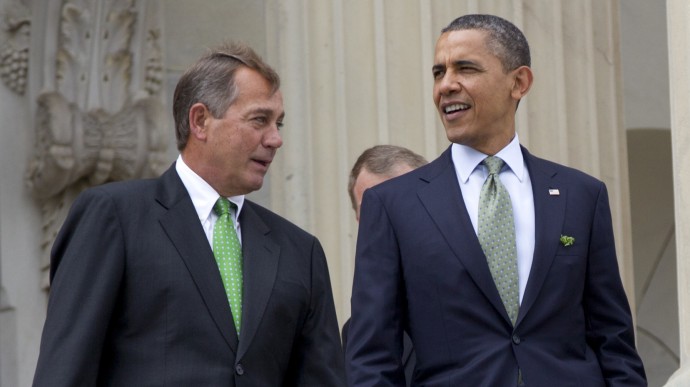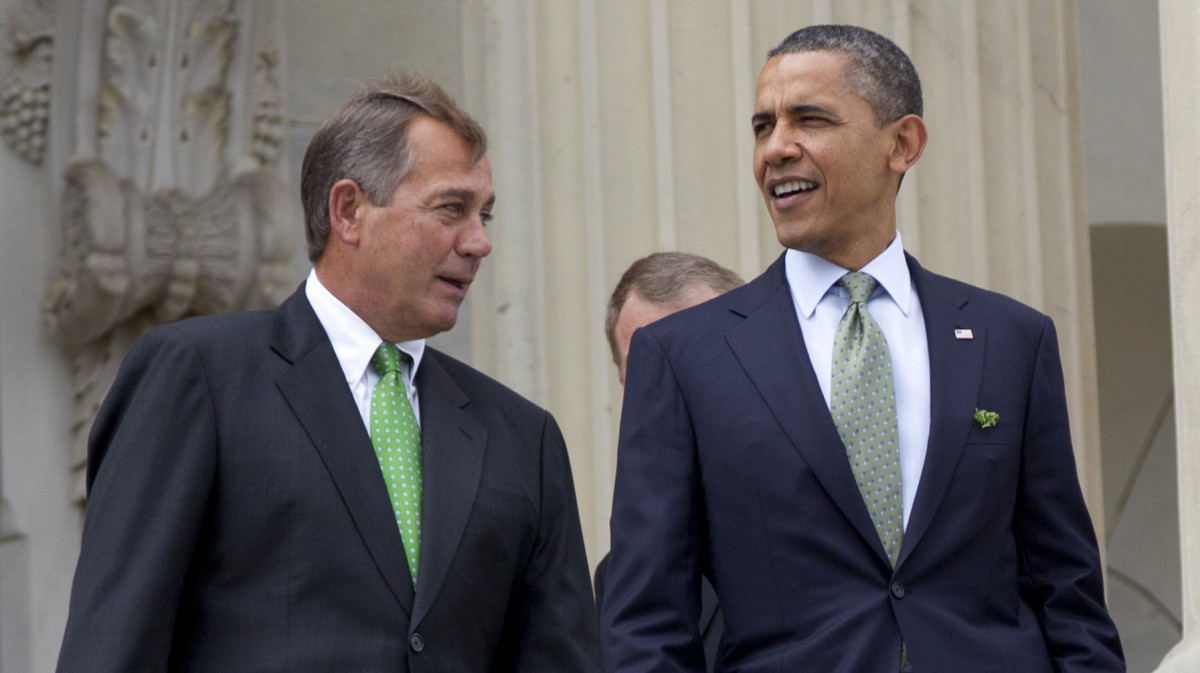
(CONNECTICUT) — The re-election of President Barack Obama was a wake-up call for some Republicans. Turns out, it’s not a center-right country after all. People like the safety net. They like public expenditures on bridges, teachers and solar power. They like the idea of soaking the very, very rich. And they believe America’s three biggest issues are jobs, jobs and jobs.
But that was then. This is now. The debate in official Washington has once again turned to the right. That’s partly the president’s fault. In his victory speech, Obama highlighted the need to get our national debt under control, and that sentiment has taken on more momentum now that everyone is focused on the imminence of the “fiscal cliff.”
They were for it before they were against it
What is the “fiscal cliff”? It’s the result of a deal struck last year with Congressional Republicans who refused to raise the debt ceiling of the United States unless Obama promised spending cuts. He made that promise. It’s called “sequestration.”
In brief, that means that $1.2 trillion are set to be cut from domestic as well as defense spending by the new year. And now that the Republicans have what they wanted, they desperately want to give it back, because, um, spending cuts actually kill jobs.
The fiscal cliff was always an excuse to demolish the safety net, but if going over it costs Americans their jobs, Obama can protect the safety net while discrediting the Republican brand even more than he did in defeating the GOP’s former standard-bearer, Mitt Romney.
The fact that spending cuts cause job loss is, of course, not something Republicans like to discuss publicly. It kinda goes against the whole anti-tax orthodoxy that has dominated the party since the debt-financing days of George W. Bush. But they know what the truth is.
That’s why they used the sequester against Obama during the presidential campaign. Romney blasted him for daring to cut defense spending, not because it would make us vulnerable to foreign invasion but because people would lose their jobs. House Majority Leader Eric Cantor even tweeted: “The sequester will harm important domestic priorities such as education, medical research, law enforcement, national security and jobs.”
No evidence, no problem
If that sounds like a contradiction, it is. But that doesn’t bother them. Nor does suppressing information that undermines key tenets of their faith in laissez-faire capitalism.
Just before the election, the nonpartisan Congressional Research Service, under pressure from top GOP leaders, retracted a study that looked all the way back to 1945. It showed no correlation between tax cuts and growth. Republicans were always on shaky moral footing with their traditional calls to cut taxes for the rich. Now there’s no evidence to demonstrate that prosperity trickles down from on high. Best to suppress that, fast.
Cantor hoped that fear of the fiscal cliff would hurt Obama’s campaign. Of course, to do that, the electorate would have to forget that the Republicans forced the president into accepting such a bad deal. Thing is, as conservative writer Bruce Bartlett writes, we didn’t forget. “Voters understood perfectly well that if defense cuts cost jobs, then so do domestic cuts. And if spending cuts cost jobs then spending increases can create them.”
We are having the wrong debate
Alas, we are not debating how to spend more and create more jobs. We are instead debating deficits again. The reason for that is partly because of the national media’s preference for covering winners and losers. We are told that the winner so far is Obama. Republicans want to do something, but the president can do nothing, because once we go off the fiscal cliff, as we should, our focus will then turn to climbing back up.
The obvious solution would be middle-class tax cuts and spending increases to stimulate job growth, a terrible position for a party dedicated to serving the rich and shredding the safety net. Republicans would be smart to give Obama what he wants, which is letting the Bush tax cuts expire for those making more than $250,000 a year. Give him his revenues so Republicans might later be in a better position to demand “entitlement reform.”
That’s why Republican Congressman Tom Cole is voicing dissent. He’s saying deal now, demand later. Yet House Speaker John Boehner told reporters on Wednesday: “I told Tom earlier in our conference meeting that I disagreed with him. [R]aising taxes on the so-called top 2 percent — half of those taxpayers are small-business owners that pay their taxes through their personal income tax filing every year. The goal here is to grow the economy and control spending. You’re not going to grow the economy if you raise tax rates on the top two [percent]. It’ll hurt small businesses; it’ll hurt our economy.”
Funny stuff
Obama said this week that a deal could come by Christmas. Meanwhile, we are witnessing a lot of spectacle. Indeed, for those of us on the political left, it’s been loads of fun watching hardline Republicans explain why they are wriggling out of a 20-year-old pledge to never ever ever raise taxes, which in this case isn’t really a tax hike as much as it is letting tax cuts expire, but that’s a distinction without a difference among true believers.
I have particularly enjoyed watching Saxby Chambliss, the U.S. senator from Georgia, rekindle his patriotism, “I care more about my country than I do about a 20-year-old pledge.” This, you’ll recall, is the same man who implied in 2002 that his Democratic rival, Max Cleland, wasn’t all that patriotic. Sure, he lost his legs and half an arm in the Vietnam War. But he probably picked up that grenade on purpose just so he could go home.
Like I said, fun.
Yet as we wait, progressive activists and labor unions are biting their nails. They remember Obama the Centrist who dreamed of striking a “Grand Bargain” last year and who was willing to agree to awful cuts to Social Security and Medicare. In fairness, Obama was staggering politically back then. He’s in much better shape now. But his re-election, one could argue, came in part thanks to unions. They delivered the Midwest. He owes them.
There are many downsides to the Citizens United case (hundreds of millions of dollars spent on attack ads on TV, for one thing) but the upside hasn’t gotten much attention. In the past, labor unions were only permitted to target union households in their massive get-out-the-vote campaigns. Now they can target anyone. Throughout the Midwest, unions put millions of boots on the ground to drive working-class voters to the polls. Vote for Obama, they said, because he saved the automotive industry. Vote for Obama, because he wants to tax the rich guys. And: Vote for Obama because he wants to create jobs.
This is just the beginning (or should be)
Again — that was then. This is now.
Progressive groups and labor unions have been pressuring the president for the past week. But they haven’t been pressuring him to increase spending and thus create more jobs. They have been pressuring him to keep social insurance programs off the bargaining table.
That’s a defensive, not offensive, posture. That’s not something you’d expect after Obama’s decisive victory. Even so, they are getting what they want. According to TPM, progressives and unions are starting to feel reassured that Obama’s head is in the right place. Even U.S. Sen. Dick Durbin, who had previously endorsed deep cuts to the safety net, said Congressional Democrats should keep Social Security and Medicare off limits.
“It’s a weird thing that Democratic leaders like Dick Durbin … appear to be embracing the ideas that progressives are pushing,” Adam Green, co-founder of the Progressive Change Campaign Committee, told TPM. “I read Dick Durbin’s speech and it’s actually beautiful.”
That’s great but let’s make no mistake. As long as Obama is talking about deficits, he’s losing. And so are we. Obama is right to force Republicans to concede on higher taxes for the rich, but remember, the president is only demanding a return to the top marginal rate of the Clinton years, or around 35 percent. It was as high as 90 percent in the 1950s.
He’s also not setting the terms of debate. This isn’t about raising taxes. This is about letting tax cuts expire. The distinction does make a difference. Republicans believe that tax cuts are what drive the economy, so any attempt to remove them can be attacked for trying to stymie economic growth. But we know that personal tax rates have no discernible effect on economic growth. The report by the nonpartisan Congressional Research Service told us that. Previous reports, going back to the Reagan administration, have said the same.
So the real issue is not whether raising taxes will hurt the economy. The real issue is raising taxes in order to raise revenue in order to spend more — and that will spur economic growth. Voters sent the president back to Washington to fix the economy. That was their No. 1 issue, according to exit polls. Fixing the economy means creating jobs.
Getting the rich to pay their fair share is a good place for Obama to begin honoring his mandate, but it can’t end there. Economic justice feels good but it doesn’t pay the rent. Obama also needs to make the case for more spending, which shouldn’t be hard to do, because, as we saw during the campaign, Republicans know that spending equals jobs.


